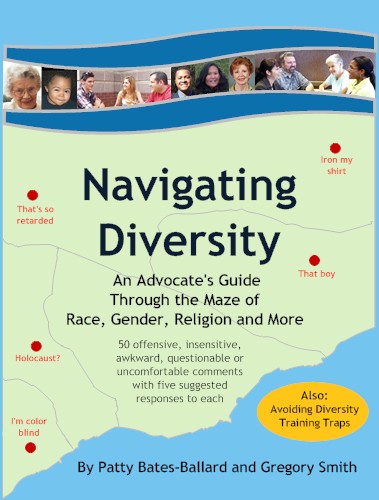







Copyright 2008, Navigating Diversity
Website developed by WordSmooth
Ask the Navigators
Not sure how to respond to a comment you've heard?
Tell us about it and we'll publish some possible responses.
Do you have a suggested response for a comment?
Please give us your input!
Name
State
Questionable or insensitive comment
The book Navigating Diversity analyzes 50 insensitive or questionable comments, offering a range of possible responses. But new comments surface every day.
So we provide here some suggested responses to recent comments from the presidential campaign:
"I don't trust him. He's an Arab."
Thought provoking: What is your experience with Arabs? Have you ever known an Arab? What about Arabs causes you to distrust them?
Personal: I feel uncomfortable with your comment because it seems to exclude Arabs from the possibility of being trustworthy people. I know several people of Arab descent and they are just as trustworthy as anyone else.
Light: There are a lot of non-Arabs I don't trust.
Informative: According to the U.S. Census, there are over 1/2 million Arab-American U.S. citizens, the vast majority of whom are honest, hard-working, decent people.
Authoritative: Don't make assumptions about a person's trustworthiness based on ethnicity. Trustworthiness has very little to do with ethnicity.
Your suggested response
What kind of mother would run for Vice President when she has a special needs child?
Thought-provoking: What experience do you have with mothering and children with special needs? What do you know about her child raising arrangements with her husband and extended family? Would you ask that question of a man?
Personal: I am a working mother / I know many working mothers who feel exhilarated by both being a mother and contributing in a larger way to society. I don’t even want to think about a world in which women and mothers could not contribute their political talents.
Informative: A 2007 Canadian study showed that when families had to adjust their work schedules because of a child’s special needs, 64 per cent of the time it was the mother who did so. In 25 per cent of cases, both parents adjusted their hours. Eight percent of the changes were made by fathers, and other family members adjusted their paid work in three per cent of cases.
Almost equal amounts of parents worked fewer hours (38%) and just adjusted their work schedules to accommodate their children’s special needs (36%). So while many mothers do find that having a child with special needs affects their work, a supportive extended family network can significantly reduce the impact.
Also, when describing a condition, it is usually preferable to put the person first, as in “child with special needs.” “Special needs child” describes the child primarily by a medical diagnosis, while “child with...” describes what the child has, not what a child is.
Light: I'm just happy to see a woman on the ticket.
Authoritative: That is an insensitive and sexist statement. I am sure anyone who has risen to lead one of our 50 states has the wherewithal to develop a system to ensure her children’s needs are met. And please try using person-first language, as in "child with special needs" instead of "special needs child."
